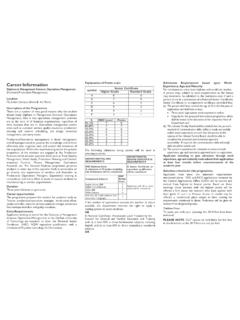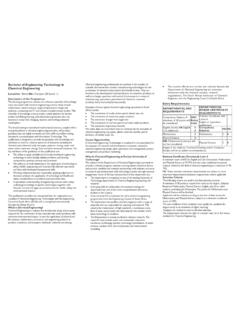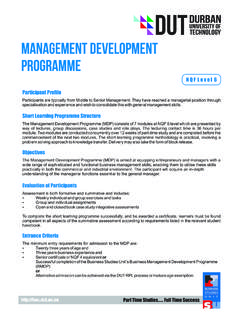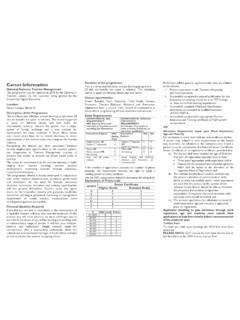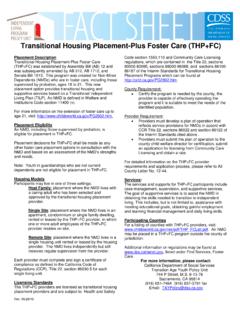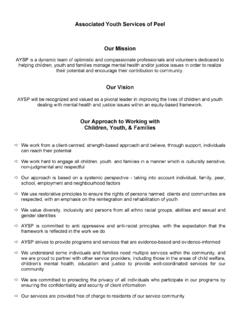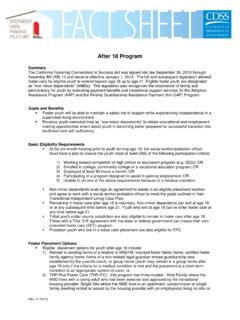Transcription of Career TheInformation - Durban University of …
1 Career Information Bachelor of Child and youth Care Location Ritson Campus Description of the Programme Child and youth Care Child and youth care work is work with children and youth as whole persons, in order to promote their social competence and healthy development, by participating in and using their day-to-day environments and life experiences and through the development of therapeutic relationships, most importantly with the particular child or youth who is the focus of attention.
2 -Anglin, J. 1995. Child and youth Care: A Unique Profession. The Child Care Worker, 13(2):10-11. Feb. The four-year Bachelor of Child and youth Care professional degree aims to provide students with skills, knowledge and experience of working in a variety of child and youth care settings. The major focus is the development and healing of the child within family, community and other settings. The study, practice and application of knowledge are strengthened through practical training and community projects.
3 These involve the student in the child and youth care worker's duties related to holistic care, behaviour management, and developmental assessment and programming to optimize the health and well-being of young people and families. The child and youth care worker does not undertake therapy in the traditional sense; rather, she/he has the job of purposefully creating and using a developmental and therapeutic milieu, building a therapeutic relationship with the child, and promoting healing and development through the conscious use of events as they occur in the life-space.
4 The child and youth care worker is not a psychologist, social worker or a teacher, but should be able to work with these professionals on an equal footing within the multidisciplinary team. Career opportunities At present, the areas in which learners and graduates work include the following: Residential child and youth care/treatment centres ( children's homes, substance abuse programmes) State facilities ( places of safety, secure care; special schools) Probation programmes Street shelters and outreach programmes Educare centres Community development projects Assistant Probation Officers in law courts Day-care and play-care centres Hospitals caring for abandoned children Mediators and facilitators in at risk communities Hostels at residential/educational facilities Diversion programmes Wilderness training and adventure programmes Schools and after-school care programmes youth development programmes Intermediaries in court settings
5 Who Should Apply? Child and youth care work requires practical people with academic ability, a strong concern for children and youth , and commitment to the development of human beings and society. The emphasis on use of self as a therapeutic tool requires students who are willing to face personal challenges for their own development. The major focus is on children and youth who are marginalised, or at risk of becoming marginalised. Students require enthusiasm, initiative, creativity, and the ability to be reflective and responsible.
6 Students are expected to engage in a rigorous process of self- development and to commit themselves to ethical standards. We reserve the right to select applicants. Final selection and placement will be dependent on completing an assessment and interview. Applicants are notified of the outcome of the selection process during December. Selected applicants will be placed in the four-year professional degree programme. The programme includes care, development and therapeutic work across the life-span with a particular focus on children/ youth from birth to 18/21 years of age.
7 The Bachelor of Child and youth Care is offered on a full- time basis in Durban . Entry Requirements DEPARTMENTAL NSC REQUIREMENTS DEPARTMENTAL SENIOR CERTIFICATE REQUIREMENTS NSC subjects A Senior Certificate or equivalent qualification. Compulsory Subjects NSC Rating Code Compulsory Subjects HG SG English (home) OR 4 English (Home) D B English (1st additional) 4 English (1st additional) B A Three additional 20 credit subjects (no more than one (1) additional language)
8 From the designated list of subjects 4 RATING CODE RATING MARKS % 7 Outstanding achievement 80-100 6 Meritorious achievement 70-79 5 Substantial achievement 60-69 4 Adequate achievement 50-59 3 Moderate achievement 40-49 2 Elementary achievement 30-39 1 Not Achieved 0 - 29 Additional Entry Requirements: Students are required to present themselves for an interview and an entrance assessment. The applicant will be required to provide proof of having undertaken voluntary work or employment with children, youth , families or communities.
9 Tuition Fees To assist you with your planning, the 2018 fees have been indicated. An increase for next year to accommodate the inflation rate can be expected. PLEASE NOTE: DUT cannot be held liable for the fees in this brochure as the 2019 fees are not yet final. First Year Curriculum: 2018 FEES Semester One Child and youth Care Work IA R3 740 Human Development IA R3 740 Personal and Professional Development I R2 800 Communication for Child & youth Care Workers R3 460 Faculty General Education R4 900 Total R18 640 Semester 2 Child and youth Care Work IB R3 740 Human Development IB R3 740 Behaviour Management I R3 500 Child and youth Care Work Practice I R4 200 Cornerstone 101 R2 800 Total R17 980 Contact Department for Further Information on Fees CAO Code.
10 - DU-D-CYC Closing Date for Applications: 30th August 2018 FOR FURTHER INFORMATION Department of Community Health Studies Durban University of Technology P O Box 1334 Durban 4000 Tel: (031) 373 2696 Fax: (031) 373 2038 APPLICATION FORMS Contact the Central Applications Office ( ) Address letters to: Central Applications Office Private Bag X06 Dalbridge 4014 Tel: (031) 2684444 Fax: (031) 2684422 Internet: This leaflet is for information purposes only and is not binding on the Durban University of Technology.

